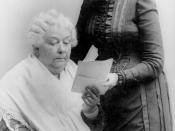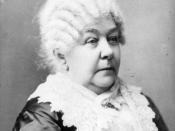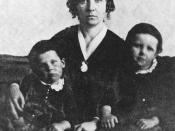In America's first century of existence, women were vital to the survival of the colonies; however, they were not equal to men. Women struggled to gain the same economic and political opportunities as men over the next centuries. Even during the earlier years prior to World War I, women were not entitled to the same opportunities given to men. Since many American soldiers fought in World War I, women were needed to fill the void left by the men. Thus, women had become exposed to a new way of living and thinking. "The Roaring Twenties dawned with the knowledge that World War I, the "ÃÂwar to end all wars,' had finally ended."ÃÂ However, women continued laboring in the workforce. The Roaring Twenties has set the foundation to the revolution for changes in women's fashion, opportunities, and perceptions for the 20th century.
It took over a century of movements for women to gain their rights and equality.
Before the 20th century, women were not allowed ownership of personal and real estate, control and guardianship of their children, and wages earned; however, they were given to their husbands. Women had absolutely no rights. They were expected solely to bake, cook, wash sew, and care for the babies like housewives. Very few girls were allowed to receive and education and no colleges had admitted female students. Due to the many restrictions put upon women, heroines such as Lucretia Mott, Elizabeth Cady Stanton, Susan B. Anthony and Lucy Stone spend most of their lives fighting for equal rights. Their fight has set the foundation for women rights in the 20th century.
In 1840, female activists such as Lucretia Mott, a Quaker, and Elizabeth Cady Stanton both became aroused when they were denied the entry at the London antislavery conference. So in 1848, Mott and...


